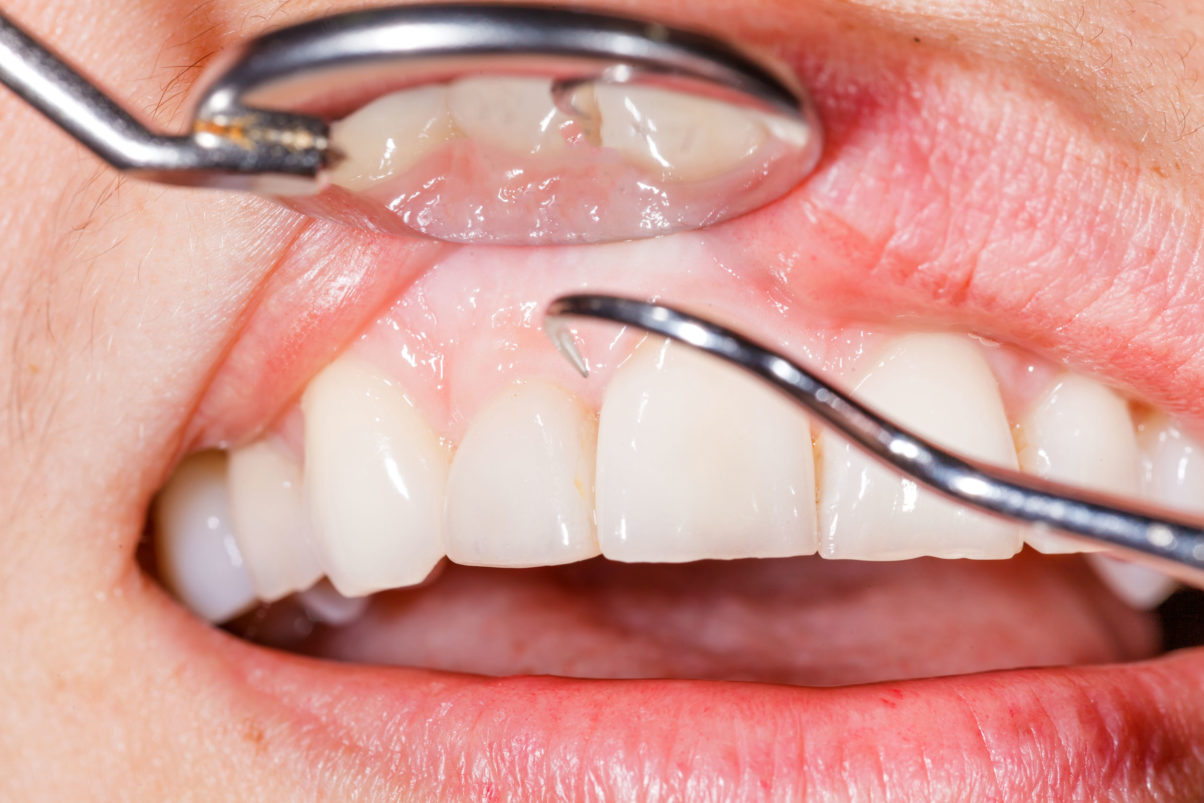47.2% of adults aged 30 or older have periodontal disease in the United States, according to recent findings from the Centers for Disease Control and Prevention (CDC). Periodontal disease, also referred to as gum disease, is an inflammatory disease that can permanently damage your gums, teeth, and jaw bone and is also strongly correlated with systemic conditions such as Type 2 Diabetes and heart disease.
Keep reading to learn more about what causes periodontal disease, what symptoms to look out for, and available dental treatments.
Causes:
Poor oral hygiene practices can allow bacteria to build up around your teeth and gums, contributing to gingivitis, or inflammation in your gums. If left untreated, gingivitis can worsen into periodontitis, which damages the soft tissue and bone that supports your teeth. While bacterial infection is behind all forms of periodontal disease, a variety of factors can influence the severity of the disease. These risk factors include:
- Genetic susceptibility. Periodontal disease can be influenced by heredity. To minimize your risk, speak with your dentist.
- Smoking. Smoking is a well-established risk factor for periodontal disease. Smoking can lead to the destruction of the supporting tissues of the tooth.
- Age. Periodontal disease increases with age. In the United States, 70.1% of adults 65 years of older have some form of periodontal disease.
- Diet. High carbohydrate intake has been associated with periodontal disease and tooth decay. A well-balanced diet may minimize your risk of contracting oral health diseases.
- Health history. Periodontal disease may also be connected to other diseases, including heart disease, diabetes, and rheumatoid arthritis.
- Medications. Certain medications may cause gum swelling and overgrowth. If you use over-the-counter or prescription medications, let your dentist know during your visit.
Symptoms:
The following symptoms are a side effect of your body’s natural response to the presence of harmful bacteria.
- Red, swollen, or tender gums.
- Gums that bleed during or after tooth brushing.
- Persistent bad breath or bad taste in mouth.
- Receding gums.
- Painful chewing.
- Loose or sensitive teeth.
Even in the absence of symptoms, it is important to visit your dentist for a routine examination. If left untreated, gum inflammation can advance into a more serious infection. At your checkup, your dentist will use a visual assessment and gum probe to determine your overall oral condition. If you notice any symptoms before your scheduled visit, call to schedule an immediate appointment.
Prevention:
Although periodontal disease is permanent once contracted, its earlier form, gingivitis, can be reversed with proper oral care. To reduce your risk, start adding these four habits to your daily routine.
- Brush twice daily for two minutes. Brushing after meals helps remove food debris and plaque buildup between your teeth and gums.
- Floss at least once daily. Flossing removes food particles and plaque between your teeth that your toothbrush can’t reach.
- Visit a dentist twice a year. Protect your teeth and gums by visiting your dentist twice a year for an oral examination and preventative cleaning.
- Evaluate your risk. Age, smoking, diet, and genetics play a role in your risk for periodontal disease. To know your risk, talk with your dental professional.
Treatment:
At Gentle Dental, our dentists take into consideration the complexity of a patient’s case before presenting treatment options. The goal of gum disease treatment is to reduce gum swelling, the depth of the pockets, and the overall risk of infection. Available treatments may include nonsurgical therapies to control bacteria growth, as well as surgical procedures to restore supportive tissues. To learn more about your treatment options, consult with your local dentist.
Final Word:
While periodontal disease is incurable, it can be controlled with proper treatment from your dentist. To minimize your risk of contracting it, visit your dentist twice a year for a routine oral exam and preventative cleaning. Need an immediate consultation? Our dental team is ready to help.


 Previous Article
Previous Article

